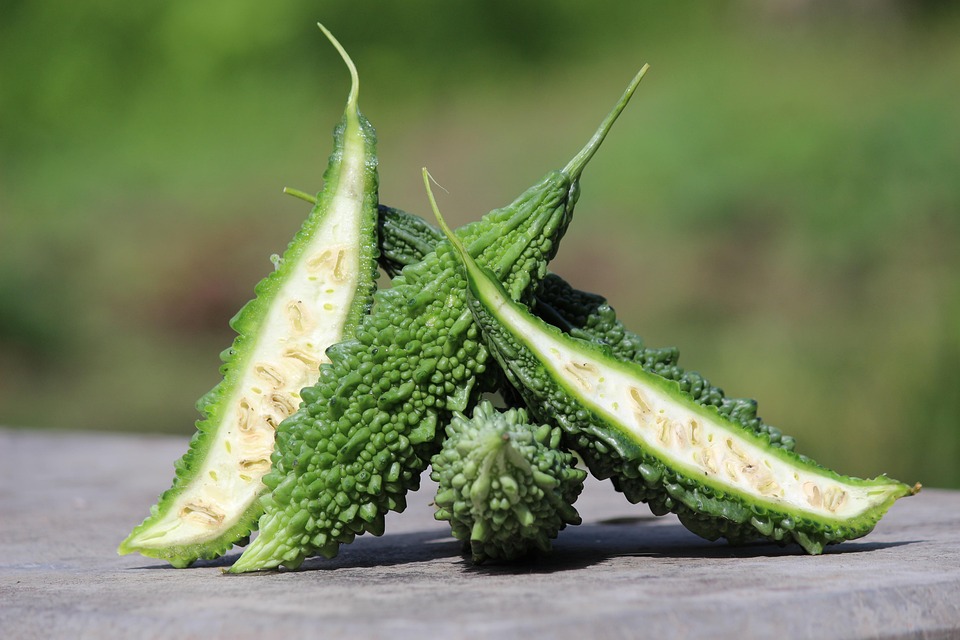7 Benefits of Bitter Melon for Blood Sugar Control
Midday slump meets your favorite mug—coffee in hand, you glance toward the snack cupboard. Perhaps it’s time for a bite, but something holds you back: the numbers on your blood sugar monitor. If this sounds familiar, you might be searching for ways to keep your glucose levels steady and your cravings at bay.
Bitter melon, a green, knobbly fruit often found in Asian and Caribbean cuisines, has become a subject of interest in managing blood sugar levels. It’s more than just an ingredient; it offers several potential benefits for those navigating the complexities of glucose control. Here, we’ll explore seven notable benefits of bitter melon, bolstered by scientific research.
Contents
1. Lowers Blood Sugar Levels
One of the most prominent benefits of bitter melon is its ability to reduce blood sugar levels. This fruit contains compounds that mimic insulin, which can help to lower blood glucose levels. A study published in the Journal of Ethnopharmacology found that bitter melon extract significantly lowered blood sugar levels in type 2 diabetes patients, indicating its potential as a natural therapeutic agent (Srivastava et al., 2009).
However, it’s essential to approach this benefit with caution. While bitter melon can assist in lowering blood sugar, it should not replace any prescribed medication without consulting a healthcare professional.
2. Enhances Insulin Sensitivity
Bitter melon has been shown to improve insulin sensitivity, allowing the body to use glucose more effectively. In a 2015 study published in Phytotherapy Research, researchers noted that bitter melon extract could enhance insulin sensitivity in patients with type 2 diabetes. This is particularly valuable for those struggling with insulin resistance, a condition where the body’s cells become less responsive to insulin’s effects (Zhang et al., 2015).
Incorporating bitter melon into your diet might be a practical step toward maintaining balanced sugar levels, but it’s wise to monitor how your body responds, as individual reactions can vary.
3. Supports Weight Management
For many, managing weight is a crucial component of blood sugar control. Bitter melon has a low calorie count, making it a great addition to calorie-conscious meals. Moreover, some studies suggest that bitter melon might aid in fat metabolism. A publication in the Journal of Diabetes Research pointed to its potential role in weight reduction, particularly in overweight individuals dealing with diabetes (Kumar et al., 2016).
Nonetheless, while bitter melon might support weight loss, it’s essential to combine its consumption with a balanced diet and regular physical activity for optimal results.
4. Provides Antioxidant Properties
The antioxidants present in bitter melon can bolster your body’s defenses against oxidative stress, which is especially important in the context of diabetes. A 2018 review in the International Journal of Molecular Sciences discussed how the antioxidant activity of bitter melon may protect against diabetes-related complications by reducing inflammation and oxidative stress (Zheng et al., 2018).
While the antioxidant benefits are promising, remember that a variety of foods rich in antioxidants should be part of your overall dietary strategy.
5. May Improve Digestive Health
Bitter melon is high in fiber, which is beneficial for digestive health and can aid in maintaining stable blood sugar levels. Research published in the Journal of Nutrition highlights the correlation between a fiber-rich diet and enhanced glycemic control (Slavin, 2013).
However, some people might find bitter melon’s taste off-putting, so it’s worth experimenting with recipes, such as stir-fries or smoothies, to enjoy its benefits while making it palatable.
6. Supports Immune Function
Maintaining a robust immune system is vital, especially for those managing diabetes, as hyperglycemia can impair immune function. Some studies indicate that bitter melon may help boost the immune response. A 2017 study in Food Science & Nutrition suggests that certain phytochemicals in bitter melon can modulate the immune system (Cuervo et al., 2017).
Nonetheless, incorporating diverse nutrient sources is essential for overall health, so don’t rely solely on bitter melon for immune support.
7. Offers Antimicrobial Properties
Bitter melon has shown promise in combating certain bacteria and fungi in laboratory settings. A review published in Frontiers in Microbiology noted that bitter melon extracts exhibited antibacterial and antifungal activities (Fadhl et al., 2020). Though this aspect may not directly relate to blood sugar, it suggests additional health benefits that complement its effects on glucose control.
While the antimicrobial properties are intriguing, relying solely on bitter melon for illness prevention is not advisable. A well-rounded approach to health is paramount.
FAQs
1. Can I take bitter melon supplements instead of eating the fruit?
Yes, bitter melon supplements are available, but it’s advisable to consult with a healthcare provider before starting any supplementation to ensure it aligns with your health goals and conditions.
2. Is bitter melon safe for everyone?
Most people can consume bitter melon in moderation. However, those on blood sugar medications or with certain health conditions, such as hypoglycemia, should consult with a healthcare professional before incorporating it into their diets.
3. How can I prepare bitter melon for a better taste?
Bitter melon can be sautéed with onions, garlic, or mixed into stir-fries. Marinating it in spices or incorporating it into smoothies with sweeter fruits can help mask its bitter flavor.
4. How much bitter melon should I consume daily?
There is no universal recommendation as it can vary based on individual health conditions. However, incorporating small amounts into your meals and gradually increasing as tolerated is a practical approach.
Conclusion
Exploring the potential benefits of bitter melon can be an empowering step for anyone looking to manage their blood sugar levels naturally. Its unique properties may complement a balanced diet and active lifestyle. Nonetheless, it’s crucial to remember that bitter melon is not a miracle solution; it should be part of a broader strategy for health that includes regular medical advice and monitoring.
As you contemplate adding bitter melon to your routine, consider how it might fit into your dietary palate. After all, navigating blood sugar control is a personal journey—one that you don’t have to walk alone.
References
-
Srivastava, A., et al. (2009). “Antidiabetic potential of Momordica charantia: An overview.” Journal of Ethnopharmacology. URL: https://www.sciencedirect.com/science/article/pii/S0378874108004905
-
Zhang, X., et al. (2015). “Effects of Momordica charantia extract on insulin sensitivity and glucose metabolism.” Phytotherapy Research. URL: https://onlinelibrary.wiley.com/doi/full/10.1002/ptr.5402
-
Kumar, P., et al. (2016). “Therapeutic efficacy of Momordica charantia on body weight and glycemic control.” Journal of Diabetes Research. URL: https://www.hindawi.com/journals/jdr/2016/1019238/
-
Zheng, J., et al. (2018). “Momordica charantia: A natural remedy for diabetes.” International Journal of Molecular Sciences. URL: https://www.mdpi.com/1422-0067/19/7/1927
-
Slavin, J. (2013). “Fiber and prebiotics: Mechanisms and health benefits.” Journal of Nutrition. URL: https://academic.oup.com/jn/article/143/9/1040S/4572048
-
Cuervo, A., et al. (2017). “Effects of Momordica charantia on the immune system.” Food Science & Nutrition. URL: https://onlinelibrary.wiley.com/doi/full/10.1002/fsn3.1062
-
Fadhl, B.M., et al. (2020). “Momordica charantia: Antimicrobial properties and therapeutic potentials.” Frontiers in Microbiology. URL: https://www.frontiersin.org/articles/10.3389/fmicb.2020.01200/full
Get Your FREE Natural Health Guide!
Subscribe now and receive our exclusive ebook packed with natural health tips, practical wellness advice, and easy lifestyle changes, delivered straight to your inbox.





